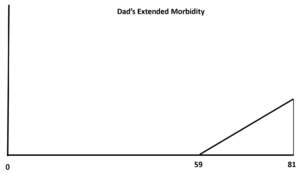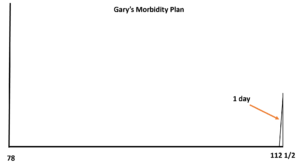Is Your Last Day On Earth Worth That “Big Mac?”

Twenty-two months ago, I penned out a blog that talked about my Dad’s extended morbidity. And about my intention to not have the same.
You can read the entire article here. Or here are some cliff notes.
My Dad made it to 1998 and age 81 – right on today’s average lifespan. But, a big chunk of the 81 years wasn’t pretty.
Here’s a chronology of his “fourth quarter.”
- Heart attack – age 59
- Stopped smoking, ate better, lost some weight
- Early 70s, diagnosed with COPD – began a restricted life of hoses and oxygen tanks
- Age 77, falls, breaks a hip
- Hip replacement
- Sepsis infection following surgery – extended intubation
- Extended hospital recovery from intubation; no voice, no sleep
- Rehab facility
- A short stint in a small retirement home
- One year stay in a larger nursing home
- Second heart attack in the nursing home; dead next day at 81

Twenty-two years of insidious, creeping morbidity. And early frailty.
Do you suppose 3-4 eggs with bacon every morning for breakfast, smoking for 40 years, and no exercise outside of work may have played a role?
Today, in America, we do a little better than Dad with our extended morbidity. On average, it’s only 10 1/2 years.
Only 10 1/2 years! Aren’t we lucky?
How about a morbidity curve that’s more like this? My 35-years-to-go plan still calls for going out face-down in a trout stream having fooled another 18″ rainbow.

Do we think of such things as we enter a Carl’s Junior drive-up window? Or wolf down that breakfast burrito because we are in a hurry? Or rationalize french fries as a vegetable?
We have a deadly combination working in our culture: food swamps and healthcare illiteracy.
Part of my motivation for writing on this topic came this week after viewing a video podcast by Scott Fulton of The Longevity Advantage in which he interviewed Dr. Saray Stancic, a triple board-certified physician in internal medicine, infectious disease, and lifestyle medicine.
At age 29, in 1995, she was diagnosed with multiple sclerosis and soon thereafter was negotiating life with the help of a cane.
In 2010, she ran a marathon.
Here’s a link to the interview – I hope you will take 45 minutes and experience her amazing story.
I haven’t yet read her book, “What’s Missing from Medicine: Six Lifestyle Changes to Overcome Chronic Illness” but I’m ordering it. She sings my tune when she takes her own profession to task for its disinterest in being a conveyer of good health advice. Hers is a message that needs to be spread.
We all would do well to learn from this expert on the brokenness of our healthcare system and the extraordinary power of nutrition.
Dad didn’t have the benefit of what Dr. Stancic can tell us.
Most of us will ignore the advice.
And we’ll thus hit the CDC’s prediction that 44% of our population will be Type 2 diabetic within the next 30 years.
Can we find anything that will be more effective in bringing our country to its knees financially than that statistic alone?
Dr. Stancic confirms that your primary care provider is the last place to go to get health advice and the first place to go when your lack of health advice has taken your biology off the rails.
Or, when your 997th Big Mac (or equivalent) has some of your parts saying they are ready to be sent back to the universe.
I hope you appreciate the podcast and will share it. Let’s all do our part to get this message out: be the CEO and arbiter of your health.
Eat your vegetables!!
And tell your friends to join our growing tribe over at www.makeagingwork.com.





Another great article Gary and it reminded why I’m attempting an Ironman at age 68. I didn’t know you enjoyed fly fishing – we must hit a river one day!
Hey, Mike. Thanks for the comment. Treat me right and I’ll show you my favorite fishing spot here in Colorado that nobody on the planet knows about (yeah, right!) You’ll need to be an Ironman to get to it!
Hey Gary, Thanks for sharing. So important diet, exercise and mindset are key.
Thanks John. Sounds like you are holding up well through COVID. Thanks for taking the time to comment.
LOVE to hear doctors promoting lifestyle changes – too few of them out there!
Susan, I’m sure you are familiar with effort that Dr. Michael Greger and Dr. David Katz put behind getting the word about good nutrition. YOu’re right – far too few voices in the medical community.
I wanted to thank you for this great read!! I definitely enjoying every little bit of it I have you bookmarked to check out new stuff you post…